This project is made possible through the partnership of WATER CHARITY and the NATIONAL PEACE CORPS ASSOCIATION.![]()
This project has been completed. To read about the conclusion, scroll down below.
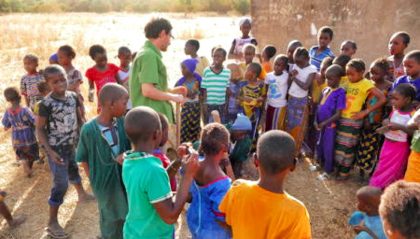 Location
Location
This project summary has been redacted for security reasons to omit the specific project location.
Lxxxxxxx, Tambacounda, Senegal
Community Description
The village of Lxxxxxxx is an ethnically Pulaar farming village with a population of about 600 in the heart of the Boundou Reserve. The economy consists of millet and peanut farmers that rely on rainy season water to grow their crops.
There is a 1-room school that is attended by over 80% of girls. Most families send sons to school in nearby Goudiry. Since Goudiry is a larger town, parents perceive the school to be better equipped for teaching, with more opportunities, a higher chance for migration to a city center, increased access to college, and increased chances of emigration for better economic opportunities.
The village is in an ecologically valuable reserve, and some local men work for free, part-time, as eco guards, teaching the local population about both the value and maintenance of the different ecosystems, flora, and fauna. They are partnered with the school, and take the students on field trips, as well as involve them in land reclamation projects and other conservation efforts.
The one teacher is a Wolof man from the tourist town Mbour, who has for 4 years worked to grow the opportunities, especially for the female students. He himself has a daughter and wife in Mbour who he sees on vacations and in the summer. He is also now fluent in Pulaar.
 Problem Addressed
Problem Addressed
The people of the village of Lxxxxxxx are experiencing water supply problems. The population draws water mostly from one well, then from rainy season streams (3 months annually). Two wells are functional for the whole Village. The animals drink from troughs from one, and the other is far from the people, providing water for a crops field. This well also dries up every year, so is not accessible year-round.
In addition, the school in Lxxxxxxx is a difficult walking distance from the village well. The students, therefore, have no choice but to share the responsibility of carrying water to the school for their needs (erasing the chalkboard, washing their hands, and using the latrine). This labor detracts from schoolwork as it is time-consuming, and tiring.
The trees planted by the students and eco guards are also in need of more than rainy season water, especially the fruit trees. Finally, the students are poor. The idea of a garden and the benefits it would bring (economic and health-related) is an impossibility without a water source.
Project Description
This project is to build a well and create a community garden in Lxxxxxxx.
The well will enable the school to have water self-sufficiency, so the students can have water for drinking, using the latrine, erasing the chalkboard, washing their hands, and for starting a garden.
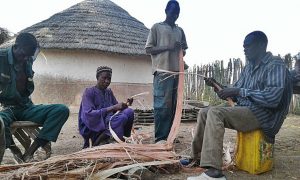 The school garden will benefit the health and well-being of the student body.
The school garden will benefit the health and well-being of the student body.
The construction time will be 4-6 weeks. At 1.5 meters in diameter, 2 meters will be hand-dug per day, for 30 meters. The lining will be added daily, made of iron, cement brick, and mortar. Cement over steel lining is to be added after the digging is completed each day.
Once the water table is reached, the bottom of the well will be built by sinking 2 precast concrete rings. Factored into the cost of well construction is a preventative structure.
At the top of the well, there will be a 3-meter cement ring on top of a gravel barrier. This serves to prohibit standing water, so as to protect the integrity of the well, prevent water from seeping into the well, and allow people to access the water safely.
A series of courses are already being taught by the PCV and the eco guards in financial and land management. The fence is complete around the school, so all that remains is a water source.
The community will provide locally-available materials, and housing for the workers.
The local teacher and volunteer eco guards are facilitating the building, maintenance, and operations of the well, garden, and live fencing in order to build the agricultural capacity of 85+ local students.
Additional lessons include safe water supply usage taught by a volunteer representative from the Service Regionale de l’Hydralique, food transformation taught by a volunteer representative from a local food agency, Experna, and Financial Planning and Business Planning taught by the PCV. Finally, this project is of an ongoing nature; locals will be trained in project management.
Project Impact
Over 600 people will benefit from the project.
Peace Corps Volunteer Directing Project
Moriah Lee. Moriah previously completed the Well and Solar Pump Project – Senegal.
Monitoring and Maintenance
The financial commitment, in tandem with business planning, by M. Sokhone has demonstrated the town’s desire for a well. The community is purchasing all of the tools to be used for the garden and well not covered by Water Charity funds.
Certain activities, including live fencing, will lower maintenance costs and increase the sustainability of the project and the future projects started by the eco guards and students.
The inclusion of local experts, including women’s groups, water specialists, eco guards, and the teacher-planned teaching events, will create a series of stakeholders who can maintain the momentum of gardening dissemination after the well is completed.
Comments
A water source will allow the maintenance of reforested trees around the school (planted by Boundou Reserve Ecoguards with the students in 2016), which will instill in the students a sense of responsibility for the ecologically significant park in which they live.
Let Girls Learn
This project will accrue to the benefit of girls, who bear the main responsibility for retrieving water and make up most of the school population. Easier access to water will make it easier for them to attend and remain in school.
Fundraising Target
$2,800
Funds raised in excess of the project amount will be allocated to other projects in the country.
Donations Collected to Date
$2,800
ADOPT THIS PROJECT BY CONTRIBUTING THE DOLLAR AMOUNT OF THE PROJECT.
Donations of any amount will be appreciated. The full amount will give you “naming rights”, if that is something you would like.
Dollar Amount Needed
$0 – This project has been paid for through the generosity of an anonymous donor. Please donate for our next project.
 Conclusion of Well and School Garden Project – Senegal
Conclusion of Well and School Garden Project – Senegal
This project has been completed under the direction of Peace Corps Volunteer Moriah Lee. To read about the start of the project, CLICK HERE.
The project was designed to build a well and create a community garden
Moriah reports:
 Abstract
Abstract
After a PCV was approached with a Fruit Tree Farm business plan; she recognized the need for grant funds for a well and solar pump for the farm to be realized. The goals of the groups involved were a market garden, an intercropped field, and a fruit tree farm. One youth group and one women’s group came together to plant trees, and are now in the process of intercropping the garden ultimately employing about 100 people ranging from age 15-76.
Background
A local father of 7, grandfather of 19 offered a business plan to build a farm to employ his neighborhood chief’s wife’s women’s group, his neighborhood youth group, and his own young sons and daughters.
There is a range of people involved:
*Totaling 100 (30 for the Dieng Family, 30+ for the women’s group, 30+ for the Associative Sportif Culterelle or ASC),
*Over half female,
*Age 15-76,
*Half literate,
*Ethnically Halpulaar,
Work experience ranging from high school students to experienced gardeners and mothers, a solar panel specialist, a local hydraulic specialist (for water testing),
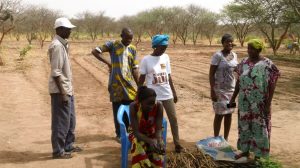 Why was the project suitable for these particular people? The 2 groups were both looking for employment, and the grant provided the opportunity for long-term work. Over the course of the implementation period (March 2017-February 2018), a series of training were held.
Why was the project suitable for these particular people? The 2 groups were both looking for employment, and the grant provided the opportunity for long-term work. Over the course of the implementation period (March 2017-February 2018), a series of training were held.
Time duration from initial brainstorming/idea conception to project selection: The PCV was approached within 2 months at the site (August 2016), and wrote the grant 6-8 months later (February 2017) after logistical research and a series of group agreements and tech team advice.
The building of the well was completed directly after Ramadan (June 2017). Rainy season started in July 2017 lasting until October 2017, so the building of the basins, fence, and pump were delayed beyond the August deadline. The installation of the solar pump itself happened finally after the basin completion.
Because of a late rainy season, and a cement shortage in Goudiry, the basins and fences were delayed for almost 1.5 months. The hard deadline for the installation of the pump changed constantly, originally scheduled in mid-summer 2017. It ultimately was installed successfully in February 2018. The standing steel structure that surrounds the pump was completed two days before the installation of the pump in February 2018.
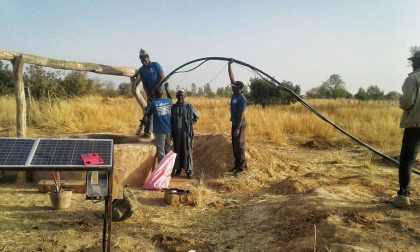 Partners
Partners
Counterpart or local work partner (e.g. NGOs) on the project: Sada Dieng (host PCV, owner of the land- split land, provided seeds, invited groups for workdays and lessons, managed project beginning to present with PCV), local Chambre de Commerce (granted certificates for youth and women who attended trainings, local Water and Forestry Office (provided a hydraulic specialist who water tested free of charge, and trained on safe water management practices), and Amadou Gakko (Solar Pump technician taught on pump installation and maintenance to youth and women).
Water Charity funded the project. Though the organization is wary of solar pumps for good reason, a number of factors contributed to the success of the grant:
*The commitment by a local solar technician to take responsibility for the pump maintenance and lessons;
*the educational benefits of exposure to the technology for the youth;
*and finally, access to deep well water in an arid climate for a tree farm, market garden, and staple crops comes best with the assistance of a pump. Pulling water at this depth for this size of a field, for this many people, is not viable.
Trainers and their sessions include Saidou Bah (irrigation, per crop water needs); Amadou Gakko (Solar Pump maintenance); Local Hydraulic Specialist volunteer (water testing and vector-borne illnesses/negative effects of vector-borne illnesses); Ag PCV (well depletion training/ effects of climate change on water), and PCV and Sada Dieng (double digging, garden best practices, gardening in the hot season, intercropping staple crops, pepineer creation and maintenance, out planting fruit trees and live fencing, and tree maintenance).
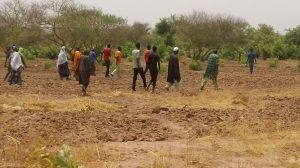 Logistically, basins, wells, and fencing can’t be installed during the rainy season. The mud prohibits stability in the earth, and the rain keeps the cement and bricks from drying. The rainy season was uncommonly long this year (2017, almost 4 months), so our delays were significant.
Logistically, basins, wells, and fencing can’t be installed during the rainy season. The mud prohibits stability in the earth, and the rain keeps the cement and bricks from drying. The rainy season was uncommonly long this year (2017, almost 4 months), so our delays were significant.
Next Steps
Monitoring and Evaluation follow-up consist of planned discussions to track the Peace Corps Outcomes listed in the project plan and grant (below). Some are food security-related, some access to water-related, and some income-related. Secondary outcomes include the number of trees that survived, technologies adopted, etc.
The sustainability of this project is undoubtedly the reason I spent the majority of my time and effort as a volunteer on it. I am looking forward to visiting Senegal in 10 years to find a thriving community garden with around 2 hectares of fertile fruit trees.
With the income from the initial crops next summer, the ASC (youth group) is planning on building a fence and then planting Cashews (Peace Corps extends the seeds) on land adjacent to the current field. I know they feel comfortable with the plan that we are making to extend the field because they have been empowered to own their responsibilities and build their skills. Cashews, the garden, and fruit trees mean money and food.
Without the solar pump and well, a project with this much scale literally wouldn’t be possible. It will go on because of the plans made into the future that I am not a part of. For example, I will not be working in the February harvest at all, but the ASC president is also the treasurer and will be budgeting funds from the benefits portion of the revenue to build fencing for the Cashew extension.
We extend our thanks to Moriah for completing this important project.